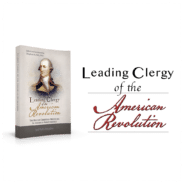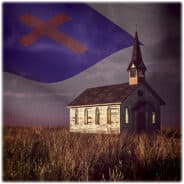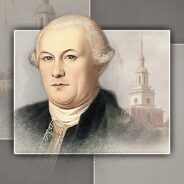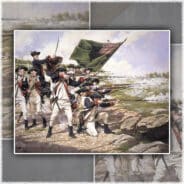Dr. Stephen Flick
Stephen Flick heads Christian Heritage Fellowship, an organization dedicated to reclaiming America’s Christian Heritage and celebrating the life-changing influence of the Gospel around the world. Concerned with the cultural decay of America, Dr. Flick has sought to provide answers to fellow Christians (and unbelievers) concerning the questions and objections to Christianity often posed by secularists and the irreligious. Dr. Flick is a writer and speaker and has authored numerous articles and books on America’s Christian heritage. He earned his PhD from Drew University (Madison, NJ) in history and Christian theology and has taught at the graduate level as full professor. He is a licensed minster and resides in East Tennessee. He and his late wife, Beth Anne, have two grown, married children and six grandchildren.
Posts by Dr. Stephen Flick:
Leading Clergy of the American Revolution
Historical, Products, Role of Pastors
$15 Sold at Amazon It may be argued that the American colonial clergy were the leading influence for American independence. The Protestant Reformation of the authority of Scripture and the priesthood of all believers gave rise to republican governments in lands were the influence of the Reformers took firm hold. In America, the authority of Scripture was often unopposed by church...Read more... Read more...
Christian Living in October
Christian Living Articles, October Articles, October Now
This post is part 10 of the series:Christian Living SeriesBy the time October arrives, many plans for the end-of-the-year activities are well underway or soon will be. No other season of the year provides as much opportunity for creating spiritual impressions upon young and old alike as do the closing months of the year. In contemporary society, Christians must conceive of ways to...Read more... Read more...
Why We Fly the Christian Flag
Christian Social Influence, Christian Witness
Welcome, and thank you for choosing to listen. Christian Heritage Fellowship is a listener supported organization, dedicated to reclaiming America's Christian Heritage and celebrating the life-changing influence of the Gospel around the world. Our organization remains committed to this purpose through the faithful giving of our friends and ministry family. If you can help us...Read more... Read more...
Elias Boudinot: Building America on Christ
September 25, 1789 Boudinot Calls upon Congress to give thanks to God While it is not true that Elias Boudinot, of New Jersey, started the Thanksgiving tradition in America, it is true that he did initiate the practice of presidential proclamations that traditionally accompany the American Thanksgiving season and which provides "an opportunity to all the citizens of the United States...Read more... Read more...
The Long Irreligious War Against America
American Founding Fathers, Marxism, Thomas Jefferson
The Afghanistan War lasted nineteen years and ten months and has been designated as America's longest war. But the war against the Christian principles that have made America an exceptional nation has been waged since the beginning of the Republic. Tyrants believe human rights are granted by human government, but the sentiment of America's Founding Fathers was aptly affirmed by Thomas...Read more... Read more...







